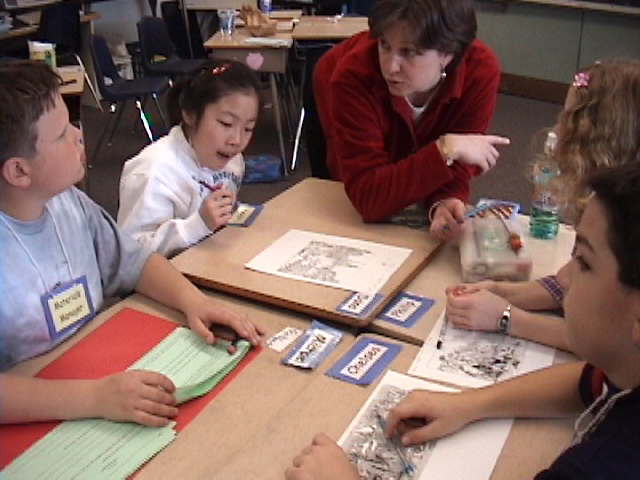Said During Orientation
I don't know if I mentioned this to the whole group, but Eric, when he
was working on that task with his group, had a great way of doing
just this thing (points to "brainstorming" on multiple abilities poster).
Eric was kind of just brainstorming words - poodle, doodle, stroodle -
and he just kept going and even though some of them were really silly,
doing that kind of brainstormimg really just gives your group lots of things
to choose from, so that was a great, uh, ability.
|
brainstorming words gives the group lots of things
to choose from
|
Said During Orientation
I noticed Tyler yesterday in his group was doing something really important.
Tyler's group was doing the activity with the different pictures and you
had to look at the pictures. Tyler was really looking at the details
in the pictures. He was noticing what the people in the pictures
were doing.
Tyler? (Tyler has his hand up.)
You already said that.
I know but I'm just reviewing. It's important enough to mention again.
Looking at those pictures in the pictures will really help your group to
draw those conclusions. Sometimes in pictures the details are
really important. So, I'm going to add (to the wallchart) "looking
at details."
|
looking at the details in the pictures will help
the group draw their conclusions
|
Said During Learning Activities
I was going to walk away but I just had to see this. Michael just
did something really interesting. He was bringing in some other knowledge.
He said I've read this Paul Revere book and in that it says he's a patriot
so he's bringing in the research he's doing from something else to this
task. I think if you all can draw on the other information you've
been learning, maybe even from other subject areas, and bring it
into this task the way Michael did, I think that might help your
group get more information to help you do it.
|
bringing in the research from something else might
help your group get more information to do the task
|
Said During Learning Activities
Excuse me, when I was standing over there I noticed when you were writing
your title here, I noticed that Ben was using the reference material.
He was checking the spelling of Crispus Attucks' name on the paper and
then saying it. That's always a great strategy, to use your reference
materials. And Ben clearly knows how to do that in a way that has
a great impact on your group. He was using it to check spelling.
You could also use it to check facts.
|
that's always a great strategy, to use your reference
materials - Ben knows how to do that in a way that has a great impact on
the group
|
Said During Learning Activities
You know, I was just listening to your group's discussion and I was hearing
somebody say, "It has to be two syllables." - Emily -
and then I heard Ben doing that brainstorming part where it (the wall chart)
talks about - thinking of the word, the vocabulary and the
brainstorming - just pushing out two syllable words, don-key, bur-ro,
what were some of the other ones you said - Lah-lah -
so that's one of those brainstorming things. Even though they were
silly, they might help your group to have more choices.
|
the vocabulary and the brainstorming, just pushing
out two syllable words, might help your group to have more choices
|

